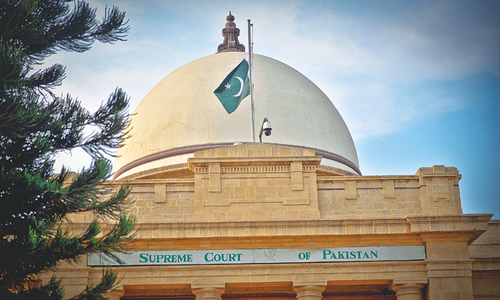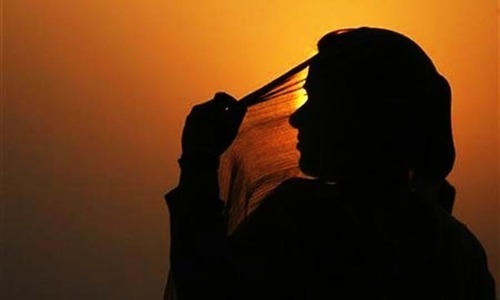The Supreme Court (SC) on Thursday resumed hearing of an unusual case of a 22-year-old woman seeking the removal of her father's name from official documents and replacing it with her mother's name instead.
Tatheer Fatima claimed that her father had abandoned her in her childhood and that she had never seen him. She raises an important question in her petition: whether or not an individual who abandons his child either before or after birth can be called the father of that child. She also asks if a child can be entitled to be registered as a citizen of Pakistan without identifying the parents.
In the last hearing of the case ─ which it described as the first of its kind ─ the Supreme Court named the law secretary, the director general of the Immigration and Passport department as well as the National Database and Registration Authority (Nadra) as respondents in the petition. The bench also directed Nadra officials to acquire information about Tatheer's real father so that he could be summoned to court.
Her father, who appeared before the three-judge bench today, was asked by Chief Justice of Pakistan (CJP) Mian Saqib Nisar when he had last seen his daughter and why he hadn't contacted her for many years.
Tatheer's father said that he last met her in 2002.
"You did not meet your daughter for 16 years," Justice Nisar responded. "You should be ashamed."
The father claimed he had attempted to meet his daughter, to which the CJP asked: "What efforts did you make? We cannot see anything."
When the top judge asked him what sort of a father he was for leaving his daughter, he responded saying that he had not left her. Instead, he said, it was Tatheer's mother who did not allow him to meet her.
The court directed the father to pay the financial expenses he owed to her. "You will have to remedy this," the top judge told her father, "The expenses for all the years that have passed will be recovered from you, even if you need to steal [to get the money]."
When he told the court that he was a poor man, the court ordered the Federal Investigation Agency (FIA) to probe his financial records to determine whether this was true. The FIA DG was directed by the court to closely examine the case.
"If you are poor, you will face the civil case and go to jail," the CJP asserted.
The top judge said that he would see to it himself how the damage caused to Tatheer could be remedied.
With regards to the change in her last name the CJP told her father that Tatheer wanted his name removed as her last name and changed to 'Tatheer Fatima binte Pakistan' instead.
"Pakistan is our mother and our father also," the CJP remarked. But, he added, Islamic law does not allow for a father's name to be removed from a daughter's name.
The Nadra director, who was present in court, was given 10 days to provide all records to the court.
The court also directed that Tatheer's birth certificate and educational record, that state her name as Tatheer Fatima binte Pakistan should be changed, with her father's name added to her first name.
During the hearing, Tatheer said when she was a Matric student, she required some documents from her father. But he had told her he would only hand them over if she submitted a written statement to the nearest jail saying that her mother was a woman of bad character and that Tatheer didn't want to live with her.
She said it should be the right of children who are deprived of their parents to adopt the name of those who have raised them. She maintained that her mother had braved great difficulties to raise her as a single parent and children should have the right to take the name of those who take responsibility for them.
She again asked the court to allow her father's name to be removed from all government paperwork.
Her mother Fehmida Butt said that providing money was not the only responsibility of a parent, and that removing her father's name from her documentation would give Tatheer satisfaction.
The court appointed Makhdoom Ali Khan as an assistant to the court and adjourned the case for 10 days.
Speaking to reporters after the hearing, Tatheer said that she had spent all her time with her mother. "I may not have seen a childhood, but I have seen the workshops and seminars [that my mother attended]."
Despite this, she said, fighting back tears, she still had to face people alleging that her mother's character was questionable. "How? Prove it," she said.
Tatheer asked why she should keep the name of a person who has not given her name any respect in his family.
When she was asked about the CJP's earlier comments that, despite how one's parents behave with them, children must respect their parents, Tatheer responded saying that a father's respect is created when their child recognises them to be a relation and gives them that status.
"You can only receive respect when you give someone the opportunity to respect you. If you misbehave with them, you will not get respect," she asserted.
Tatheer's father also spoke to reporters after the hearing, saying: "I cannot bear it. I wish the ground would open up and swallow me."
Tatheer seeks remedy beyond existing laws
Tatheer's petition is basically an appeal against a similar plea which was rejected by the Islamabad High Court on May 17, 2017. The high court, Tatheer had pleaded earlier, had failed to appreciate before dismissing her plea that she was not seeking any treatment in accordance with the law — instead a remedy which was above the prevailing laws.
She had also questioned Nadra’s earlier attempt of seeking a 'fatwa' from a religious authority of Saudi Arabia and Iran to formulate a policy about the registration of orphans in Pakistan, saying that she did not feel like an orphan in the presence of her mother, Fehmida Butt.
"The use of orphan for me is an insult to my loving mother and to Pakistan," she had contended, highlighting that her status should be determined under the Constitution of Pakistan rather than in the light of customs in Saudi Arabia or Iran.
The court in the least hearing had observed that neither Islamic laws nor laws of the land allowed deletion of a father’s name from a person’s official documents, such as passports.













































